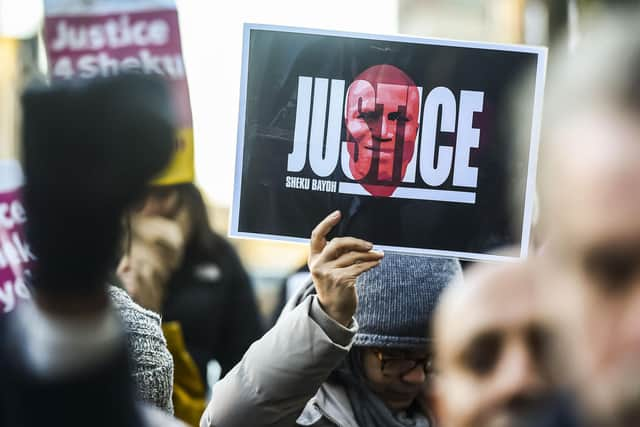Sheku Bayoh: inquiry breaks for summer after almost 60 days of evidence
and live on Freeview channel 276
The rare judge-led independent public inquiry has now heard almost 60 days of evidence with more to come, and is unlikely to issue its findings until 2024 - nine years after the 31-year old’s death.
The inquiry was set up to examine the events surrounding Mr Bayoh’s death, the subsequent investigation and whether race was a factor which his family have claimed since the start.
Advertisement
Hide AdAdvertisement
Hide AdAamer Amwar, his family’s lawyer, said the family felt “betrayed” by the police adding: “Five days of protest for George Floyd in America delivered more than in five years of waiting for the Scottish criminal justice system to act” and he added: “The issue of race, continually denied, flows through the river of this inquiry.”


Mr Bayoh died after being restrained on the ground by six police officers called to Hayfield Road early in the morning of May 3, 2015.
As the inquiry drew to an end for the summer recess, Claire Mitchell KC, who represented Mr Bayoh's family, said police sources used racial stereotypes in regard to Mr Bayoh after his death, and said he should have been treated as a medical emergency.
The point was re-iterated by Mr Anwar as he spoke outside the inquiry.
Advertisement
Hide AdAdvertisement
Hide AdHe said the family accepted Sheku had acted out of character - he had the drugs MDMA and alpha-PVP in his system - and while police had the right to act, they argued any force had to be “reasonable and legitimate” adding: He was experiencing mental health crisis and should have been dealt with as a medical emergency. Mental health crisis experts have said had he been treated in a calm, considerate manner the outcome would have been different.”
Roddy Dunlop KC, representing the Scottish Police Federation, told the inquiry the officers did their best in what he said were "terrifying" circumstances.
He added: "He was not killed by the police. He died because he created a situation in which he had to be restrained and where he was unable to survive lawful restraint."
The inquiry is set to resume in August.